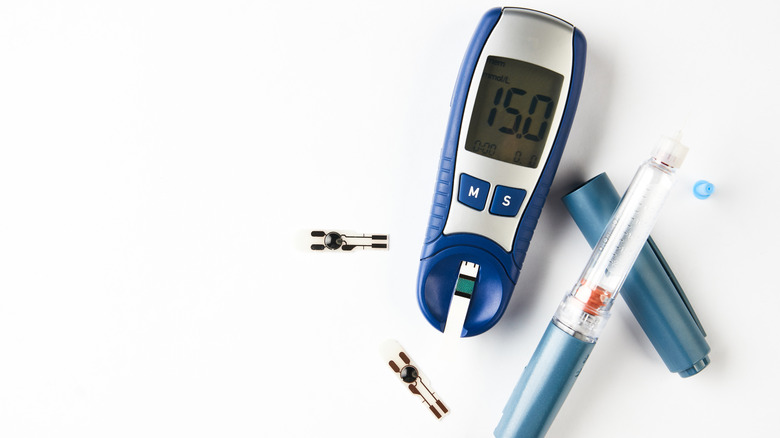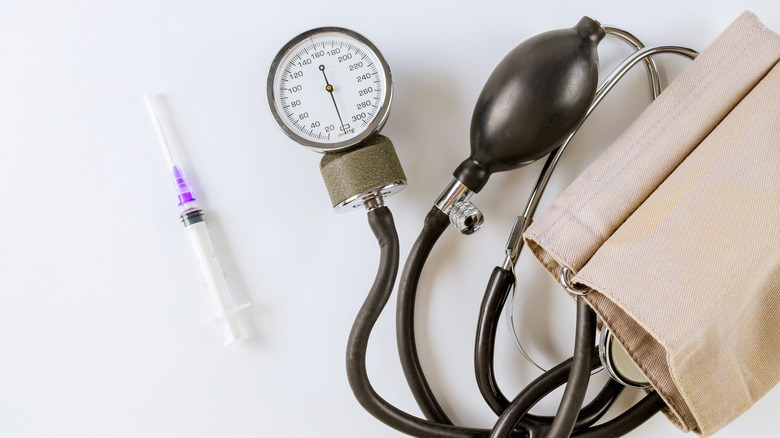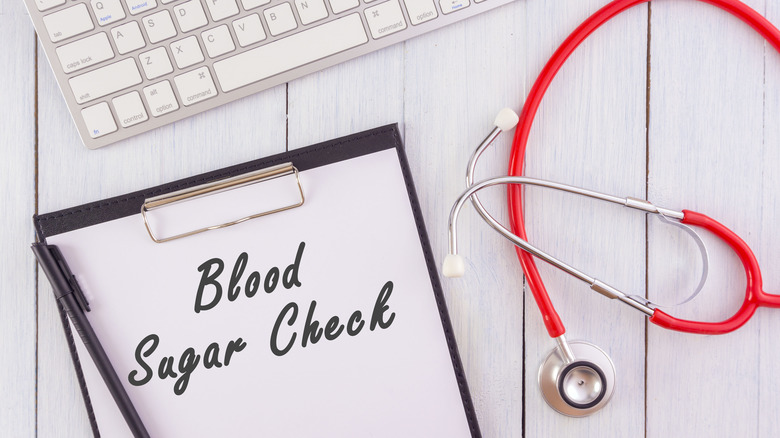Biz Markie's Cause Of Death Explained
Rapper Biz Markie, born Marcel Theo Hall, has died at age 57 due to complications from type 2 diabetes. He'd been experiencing complications from the disease for a year, according to TMZ. Markie died at a hospital in Baltimore on Friday, July 16, 2021, with his wife, Tara Hall, holding his hand.
Markie started his career in hip hop in 1985 and is known for his hit song, "Just a Friend," released in 1989. That song went platinum and became a Top 40 hit in the United States and in many other countries (via TMZ). In addition to being a rapper, Markie was a beatboxer, actor, comedian, DJ, singer, writer, and producer. He was known as the "Clown Prince of Hip Hop" (via NME).
Markie appeared in the TV show "Black-ish." He was also in the movie "Men in Black II" as a beatboxing alien, and he even voiced characters on "SpongeBob SquarePants" and "Yo Gabba Gabba" (via The New York Times). In addition, Markie released five albums. "I'm going to be Biz Markie until I die," he once told The New York Times. "Even after I die I'm going to be Biz Markie."
Biz Markie was hospitalized in summer 2020
According to TMZ, Biz Markie was in the hospital for weeks in July 2020 due to "a serious illness." A representative for Markie confirmed he'd been experiencing complications related to type. 2diabetes. No additional details were provided at the time.
In 2014, Markie talked about being diagnosed with type 2 diabetes and losing an impressive 140 pounds. "I wanted to live," Markie revealed in an interview with ABC News. "Since I have to be a diabetic, If I didn't make the changes, it was going to make the diabetes worse. I'm trying to get off [the Diabetes meds]." Markie revealed that he'd been able to halve his medications, but he was working to lose more weight to "get off the rest." As TMZ revealed, he did not pursue weight loss surgery, but instead relied on "old-fashioned" weight loss in order to better manage his diabetes.
What is type 2 diabetes?
Type 2 diabetes is a chronic medical condition in which your body doesn't respond to insulin the way it should, and sometimes your body doesn't make enough insulin. According to Healthline, insulin is an important hormone that moves glucose, or sugar, from your blood to your cells, where your body turns it into energy. When it doesn't work correctly, sugar builds up in your blood, causing various health problems.
According to WebMD, symptoms of the condition include extreme thirst, excessive peeing, blurry vision, irritability, fatigue, more-than-usual hunger, unexplained weight loss, tingling or numbness in feet or hands, and wounds that won't heal. Someone with diabetes may also experience more infections. According to Healthline, dry mouth is also a symptom of type 2 diabetes.
WebMD recommends seeing your doctor immediately if you have dark rashes around your armpits or neck, as this is a sign your body is getting resistant to insulin. As diabetes progresses, yeast infections, foot pain, and wounds that won't heal may occur. Make an emergency appointment with your doctor if you have any of these symptoms. In addition, many people who have high blood sugar, prediabetes, or diabetes don't know. So it's vital to get diagnosed and treated.
Complications from type 2 diabetes
Details have not been released about the specific complication Biz Markie experienced as a result of type 2 diabetes. However, according to the Mayo Clinic, type 2 diabetes complications can include an increased risk of certain health problems like heart disease, high blood pressure, stroke, and atherosclerosis, or the narrowing of blood vessels. Other complications may also include nerve damage (also called neuropathy), an irregular heartbeat, glaucoma, cataracts, blindness, dementia, kidney disease, bacterial or fungal skin infections, hearing problems, and sleep apnea. "We know that keeping blood sugar under control, for both type 1 and type 2 diabetes, is one of the best ways to reduce the risk of these complications," Dr. Donald Mcclain, professor of endocrinology and metabolism at Wake Forest School of Medicine, told Health.
"There's no cure for type 2 diabetes," the Mayo Clinic confirmed, "but losing weight, eating well and exercising can help you manage the disease. If diet and exercise aren't enough to manage your blood sugar, you may also need diabetes medications or insulin therapy."
Type 2 diabetes diagnosis and risk factors
As Biz Markie told ABC News, he lost over 100 pounds in 2014 in an attempt to better manage his type 2 diabetes, but he was actually diagnosed with the condition three years prior.
If diabetes runs in your family or you have any risk factors, you should get tested regularly. According to the CDC, risk factors for type 2 diabetes are being over 45, having a parent or sibling with type 2 diabetes, being overweight, having prediabetes, not being active three or more times a week, a history of diabetes while pregnant, or having had a baby who weighed over nine pounds. Another risk is having non-alcoholic fatty liver disease. You may also be at a higher risk if you are of Native American, Hispanic or Latino, Pacific Islander, Alaska Native, or African American descent. Healthline further revealed that Asian Americans are at an increased risk, as is anyone with polycystic ovarian syndrome (PCOS).
Diabetes management
Biz Markie worked hard to get his type 2 diabetes under control (via ABC News), and that showed in his 2014 weight loss, an essential part of diabetes management.
According to the Cleveland Clinic, the treatment and management of type 2 diabetes include a well-balanced diet, regular exercise, weight loss, blood sugar, blood pressure home testing, regular doctor appointments, taking prescribed medications, and quitting smoking. UCI Health adds that sleeping well is an important part of diabetes management, especially since it can lead to sleep apnea.
Eating a diet filled with whole foods like fruits, vegetables, whole grains, nuts, seeds, and beans is also vital. The Mediterranean diet or DASH diet can work well in helping to manage type 2 diabetes. Experts also recommend avoiding processed foods and junk foods. Exercise for at least 30 minutes almost every day. Something as simple as walking or swimming will help, but find something you enjoy. Work with your doctor to come up with a plan that fits you.






